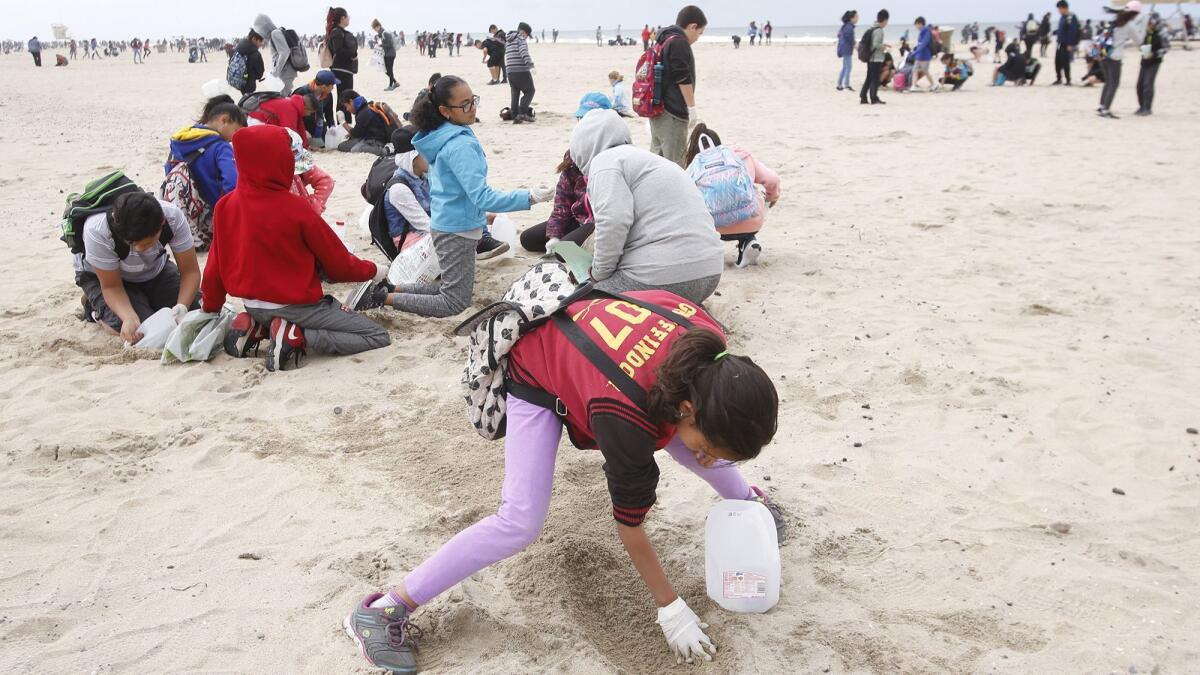At 20, Orange County Coastkeeper plans to ‘keep fighting the good fight’
- Share via
Garry Brown jokingly says he started teaching Orange County how to spell the word “environment” in 1999.
“My goal was to get people in Orange County to feel OK discussing water quality, about environmental issues, open space, quality of life and not feel that if they talked about that they were branded a tree-hugger,” said the 68-year-old Huntington Beach resident.
This year, his environmental nonprofit, Orange County Coastkeeper, is celebrating its 20th anniversary.
Though the actual anniversary was March 1, the Costa Mesa-based organization will officially toast its achievements Sept. 12 at the Balboa Pavilion in Newport Beach.
Brown said he was inspired to start the group following the temporary closure of some Orange County beaches in 1999 because of water quality problems. He envisioned an organization that could collaborate with government agencies, cities and businesses to help preserve the coastline he experienced in his childhood, where abalone shells and the Pacific bonito fish were commonly seen.
The nonprofit began with three full-time employees, an office and a budget of $125,000. It now boasts an annual budget of about $2.1 million and a total of 24 full- and part-time employees at its three offices, including its new program in the Coachella Valley.

Orange County students have learned about the dangers of marine debris through the organization’s Kids Care program. Many students each year visit the Pacific for the first time during Coastkeeper’s pilgrimage to clean a beach and later create a design for an aerial photo for Kids Ocean Day.
Coastkeeper also has partnered with organizations such as the California Department of Fish and Wildlife to help restore eelgrass in Newport Beach, which city harbor officials recently said has nearly doubled over the past decade. The group also has rehabilitated giant kelp in Laguna Beach.
But most people may recognize Coastkeeper’s name for its battles with developers.
Poseidon Water’s proposed ocean desalination plant in Huntington Beach has received pushback from environmentalists since the company pitched the idea decades ago. A Coastkeeper representative typically speaks against the project at public hearings.
Environmentalists say the $1-billion plant would harm marine life by trapping it in an intake system and by discharging briny water into the ocean.
Poseidon has said there would be no significant impact on sea creatures and that it has committed to an environmental protection and energy efficiency plan.
“We’re not against ocean desalination,” said Brown, who added that he supports the South Coast Water District’s Doheny desalination project. “Over the years, I’ve sat down and talked with [Poseidon Vice President] Scott Maloni. We’ve kept it cordial. There’s no question where we both are — we’re diametrically opposed — but on the same token, that doesn’t mean you can’t sit down and talk to them.”
Maloni did not respond to requests for comment.
Some of Coastkeeper’s public battles have turned into partnerships.
Dean Kirk, vice president of environmental affairs for the Irvine Co., said in a statement that “OC Coastkeeper has been an important partner in our master planning efforts to create a pristine environment at Crystal Cove State Park for its marine wildlife and 2 million annual visitors.”
The Newport Beach-based developer won approval from the California Coastal Commission in 2000 for a 635-home project above the park. The plan included a laundry list of water quality conditions advocated by environmentalists, including Coastkeeper.
The Irvine Co. collaborated with scientists, engineers and environmental groups to help preserve Crystal Cove’s marine life, according to a company website. It installed an elaborate system of coastal cisterns, catch basins and pumps that annually divert millions of gallons of urban runoff to treatment facilities for reuse in irrigation.
Brown said he never planned to stop the company’s project but wanted it to figure out a way not to pollute the ocean.
“From that point on, we’ve built a very constructive working relationship with the Irvine Co. … and partnered to do projects that didn’t have anything to do with development,” Brown said.
Brown said there’s still much to do. He said he envisions beaches where debris doesn’t return for more than a month after a cleanup.
“We’re slowly but surely cleaning things up,” he said. “We’re going to keep fighting the good fight.”
All the latest on Orange County from Orange County.
Get our free TimesOC newsletter.
You may occasionally receive promotional content from the Daily Pilot.




